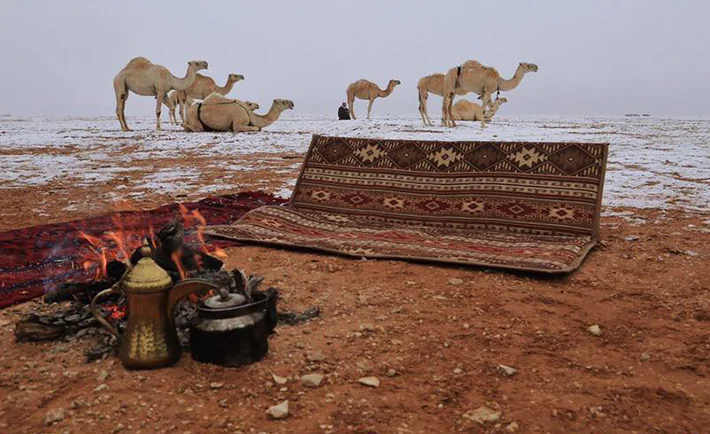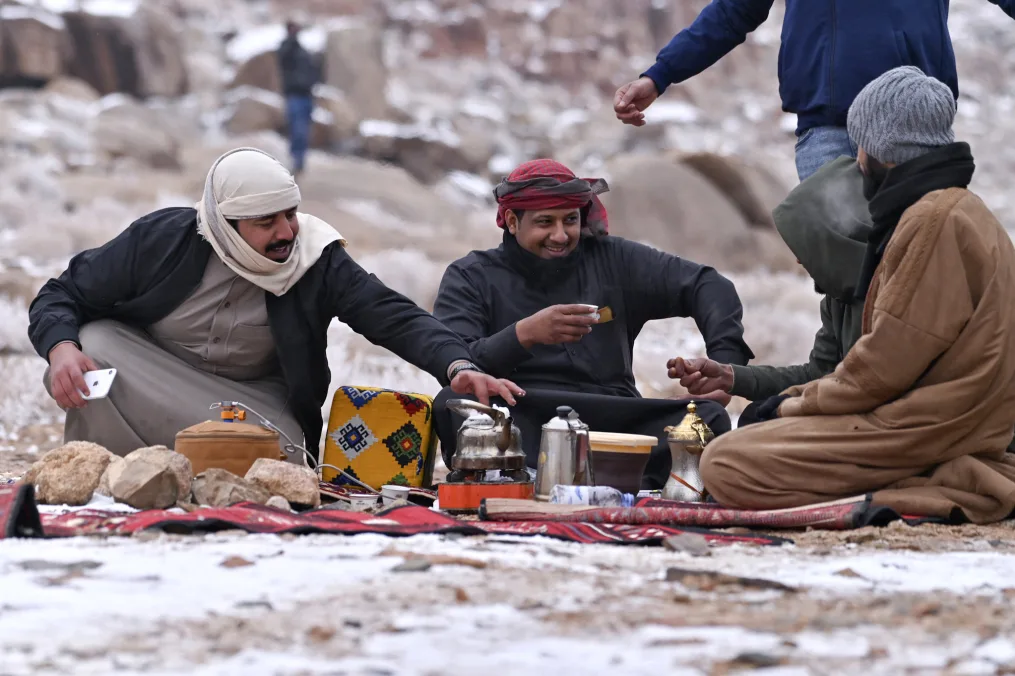 In parts of Saudi Arabia, amidst heavy rain and hail, snow has fallen on the mountains. This is already a miracle—rain and hail—let alone snow. So, let us repeat: It snowed in Saudi Arabia.
In parts of Saudi Arabia, amidst heavy rain and hail, snow has fallen on the mountains. This is already a miracle—rain and hail—let alone snow. So, let us repeat: It snowed in Saudi Arabia.
The Al-Jawf region was covered in a white blanket, while waterfalls and lush valleys transformed the landscape into scenes that no one has ever seen before on the Arabian Peninsula.
This incredible sight, where the desert is covered with snow, reminded many of one of the prophecies from Islamic tradition, writes poskok.info.
In Islamic prophecies and hadiths of Prophet Muhammad, it is mentioned that “the Arabian Peninsula will once again become lush and full of rivers.” This hadith, which some interpret as a forewarning of upcoming changes, has intrigued scientists, theologians, and ordinary people for decades. The fact that such unusual weather has hit one of the driest regions in the world might indicate a shift in climatic patterns that could have profound effects on the region.

Snow in Saudi Arabia is not an entirely unknown phenomenon, but it happens very rarely, usually in mountainous regions like Tabuk or Al-Jawf. This latest snow cover has sparked significant interest from the local community and the international public alike, as it seems broader and more widespread.
Muslim believers may feel a combination of awe and fear, seeing this snow as a potential sign that the Day of Judgment is approaching.
Many are wondering if this is the beginning of a transformation that could eventually make the desert green, turning the arid land into a fertile region abundant with water and vegetation.
Climate changes, global warming, and new weather patterns could trigger this transformation. Increased precipitation in desert areas might mean that the soil will soak in and retain moisture, which is the key prerequisite for vegetation growth.
With increasingly frequent and stronger winter storms, the Arabian Peninsula could one day become a wondrous green oasis, consistent with the hadith that predicts a return of fertility to these lands.

The hadith about snow in Saudi Arabia, often cited in the context of “end times” (eschatological signs), belongs to a group of hadiths that describe changes in the climate and environment of the Arabian Peninsula before the Day of Judgment. The hadith tells us that the desert of the Arabian Peninsula will “return” to a state of greenery and rivers.
Text of the Hadith
The hadith is found in the collection recorded by Muslim (Sahih Muslim) and narrated by Abu Huraira, may Allah be pleased with him:
Arabic text: “لا تقوم الساعة حتى تعود أرض العرب مروجاً وأنهاراً”
Translation to English: “The Hour will not come until the land of the Arabs returns to being meadows and rivers.”
Source of the Hadith This hadith can be found in the collection of Sahih Muslim, number 157, in the chapter dealing with eschatological signs of the Day of Judgment.
Meaning of the Hadith This hadith suggests that the Arabian Peninsula, known today for its desert climate, will revert to a state of greenery and flowing rivers, as it was in some earlier geological periods. Geological studies suggest that, in ancient times, the Arabian Peninsula had a much more humid climate, with rivers and lakes.
The question arises—are we witnessing changes that herald the end of times, or is this just another natural cycle reminding us of the magnitude and unpredictability of the world we live in?
Snow in Saudi Arabia ❄️❄️❄️❄️ pic.twitter.com/bRVp4Dkdeg
— Halal Nation ☪︎ (@HalalNation_) November 3, 2024
One thing is certain: these scenes have prompted us to reflect on the depth of the prophecies and the real changes that are taking place. Are rivers and green fields in Saudi Arabia on the horizon? Only time will tell, but perhaps we are witnessing the beginning of a new chapter in the history of this ancient land.
Or perhaps it is the beginning of the end of our civilization. If that’s the case, let’s toast, for we haven’t really excelled.
🏝❄️ Saudi Arabian desert covered in snow
This is the first time in history that the desert has been covered in snow, as temperatures there rarely drop to such levels.
A severe hail storm also raged there recently. pic.twitter.com/4wjSaaRMfo
— Nurlan Mededov (@mededov_nurlan) November 3, 2024
Iurkov l poskok.info